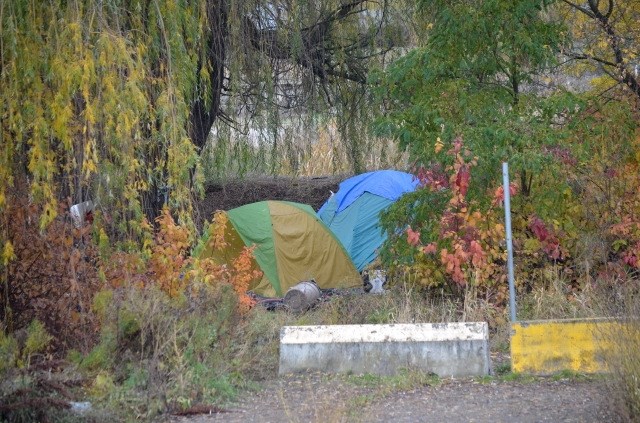
FILE PHOTO - A homeless camp in Vernon, Oct. 24, 2016. Almost 150 people in Vernon consider themselves homeless, according to recent survey, and the true number is likely even higher.
(CHARLOTTE HELSTON / iNFOnews.ca)
January 20, 2017 - 11:04 AM
VERNON - Almost 150 people in Vernon consider themselves homeless, according to recent survey, and the true number is likely even higher.
Local agencies conducted a ‘snapshot in time’ survey of people living in homeless camps and in shelters on Oct. 18, 2016 and found 144 individuals who identified themselves as homeless. The results of the survey were released in a report to Vernon city council this week.
That number likely only scratches the surface, says Barb Levesque, executive director for the John Howard Society, one of the lead agencies. She says many people do not have permanent housing but are hard to find because they are ‘couch surfing’.
“Many women become the hidden homeless, couch surfing and trading sex for a place to stay,” Levesque says.
Of the 144 people, 55 spent the night at Howard House, 25 at the Gateway Shelter, 10 on temporary mats provided in cold weather, 11 at Bill’s Place, 10 at the Women’s Transition House, and 33 in homeless camps. The survey was done by the Camp Okanagan Outreach Liaison Team over a 15 hour time period starting the evening of Oct. 18.
Of the 144, 66 participated in the survey, of which 27 per cent were women and 73 per cent men. Almost half grew up in Vernon or have family connections here, and almost 30 per cent said they had been in foster care.
“We don’t have proper supports for people leaving foster care,” Levesque says.
Three people who responded to the survey said they were homeless with their children.
“There are an increasing number of people who do not have diagnosed mental illness or addictions who are becoming homeless. Those are people who work at very low paying jobs and cannot afford accommodation at all,” she says.
There are also an increasing number of seniors becoming homeless, and that’s a fairly new trend, Levesque says.
“There’s shockingly an increasing number of seniors — largely women but not all women — whose government pensions are not enough for them to pay for an apartment, pay utilities and buy food,” she says.
She says it was surprising to see how large some of the homeless camps were when the survey was conducted.
“We knew there was a lot more people camping, but they (camps) were much larger than in the past,” she says.
Those camps have since been decommissioned by the City of Vernon, which spent roughly $30,000 cleaning up the dismantled camps.
“I think it’s a wake up call to all of us, homeless camps aren’t sustainable,” Levesque says.
She says it’s part of the true cost of homelessness. Other indirect costs to taxpayers include the heavy use of health services such as ambulances, emergency rooms and psychiatric beds; greater pressure on police; and the cost of jailing people.
The reasons people were homeless, according to the survey results, include eviction, substance use, job loss, medical issues, domestic violence and poor housing conditions. The main barriers to finding and maintaining housing were overwhelmingly low income and high rental rates, according to the results of the survey. Vernon's rental vacancy rate was just 1.9 per cent in October 2016, according to the Canada Mortgage and Housing Corporation.
Levesque attended a roundtable meeting hosted by North Okanagan-Shuswap MP Mel Arnold earlier this week, and says she’s optimistic about the possibilities.
“It’s really valuable discussion bringing all sectors together to provide our feedback to the government on what we see locally,” she says.
A national housing strategy is expected to be unveiled sometime this year.
To contact a reporter for this story, email Charlotte Helston or call 250-309-5230 or email the editor. You can also submit photos, videos or news tips to the newsroom and be entered to win a monthly prize draw.
We welcome your comments and opinions on our stories but play nice. We won't censor or delete comments unless they contain off-topic statements or links, unnecessary vulgarity, false facts, spam or obviously fake profiles. If you have any concerns about what you see in comments, email the editor in the link above.
News from © iNFOnews, 2017